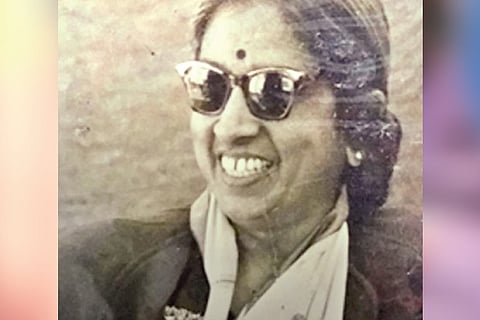

Chennai
DURING the mid-40s a Madras family was making news. The elder daughter was invading British India hacking her way through the Burmese jungles. The son was arguing in the courts in a sensational case involving comedian NS Krishnan and superstar MK Thyagaraja Bagavathar for murder charges. The youngest daughter was already a renowned classical dancer and founder of Darpana, the world-famous cultural academy in Ahmedabad. And not surprisingly, the mother who had brought them up with such high individuality was in and out of jail fighting for India’s freedom.
Ammukutty was the youngest of nine daughters in a struggling Nair family in Kerala which had lost the father and sole provider. She had never been to school and at 13, she got married to a lawyer who was 20 years older than her. Later, she became one of Madras’ shining socialites and freedom activist, constitution drafter and parliamentarian.
Swaminadhan and Ammukutty were married by the sambandam rituals — an informal mode of marriage followed by some Kerala clans and its legitimacy was being questioned in the early part of the 20th century. Swaminadhan even registered their wedding in London but his children later recalled how they were treated poorly and served food separately seated on the floor of the veranda in family get-togethers.
Swaminadhan married late in life because he spent the early years qualifying as a lawyer. After marriage, he was determined to elevate his wife’s status in society and nurtured her progress. An Anglo Indian teacher came home daily to teach her English which she soon could speak. As Swaminadhan’s career progressed, the family enrolled in British clubs and socialised with the city’s elite. The children were brought up by European nannies and the family which spoke in English at home could be termed as ‘neo-European snobs’ living in the upscale area of Harrington Road on the Cooum banks. In her new role, Ammu came out with flying colours and not one of her higher-class friends would have guessed her humble origins. It was much like Bernard Shaw’s Pygmalion.
But then a change was just around the corner. There was a prince’s school in Teynampet where the offspring of the zamindars were taught by British faculty. A scandal shook the city — De La Haye, the principal of Newington House, a college in Madras was shot one night. The suspicion squarely rested on two princes. One of them, the prince of Singampatty turned approver and the other, the prince of Kadambur was in the dock facing a certain noose. Swaminadhan appeared for the prince, argued well, demolished the prosecution’s case and got an acquittal.
Their European friends were shocked that Swaminadhan could set free a native accused of killing an Englishman. There was a social boycott of the family. Ammu’s daughters were taunted in the convent schools they went to. The Europeans they had considered close avoided them like plague.
The family led by Ammu reacted in their way. She took out the pretty frocks of her daughters and burnt them in the garden. The European nannies were eased out and the girls were shifted to Indian schools (Mrinalini went to Shantiniketan of Tagore). The family for the first time started conversing among themselves in Malayalam and Tamil. And most importantly, Ammu’s concentration turned to the ongoing struggle for India’s freedom.
Annie Besant, Margaret Cousins and Ammu co-founded the Women’s India Association which was the earliest to demand adult franchise and constitutional rights for women. Her house in Harrington Road became a hub for freedom fighters. The family even hid fugitives from the British police – Suhashini, sister of Sarojini Naidu being one who was wanted in Meerut conspiracy case.
Ammu lost Swaminadhan when she was in her 30s and refused to go along with the community’s bad treatment of the widows. She gave their children equal prospects to study, choose the careers and lives of their choice. One of her daughters Mrinalini learned Bharatanatyam and married physicist Vikram Sarabhai. The other daughter Lakshmi Sehgal became a key member of the Indian National Army of Subhash Chandra Bose and led the Rani Jhansi regiment. Her son Govind became a Crown Prosecutor and appeared on behalf of the government in court.
Ammu agitated in the Quit India movement and went to Vellore jail. She became part of the Constituent Assembly from the Madras Constituency in 1946. She always believed in speaking her mind. She once criticised Nehru for being called ‘Panditji’ — an upper-caste title and when the prime minister explained that he had never asked anybody to call him so, Ammu retorted that since he responded to it, he may have enjoyed it.
Post freedom, Ammu was one of the few women who played an integral part in drafting the Constitution but at the end of the exercise complained that it was too detailed and long. “I always imagined a constitution to be a tiny volume which one could carry in one’s purse,” she said.
— The writer is a historian and author
Visit news.dtnext.in to explore our interactive epaper!
Download the DT Next app for more exciting features!
Click here for iOS
Click here for Android